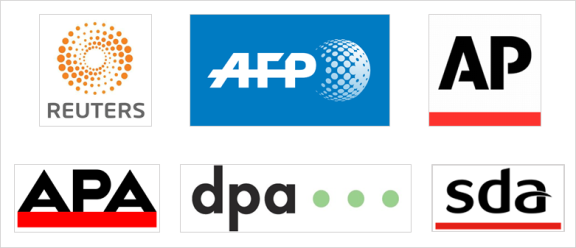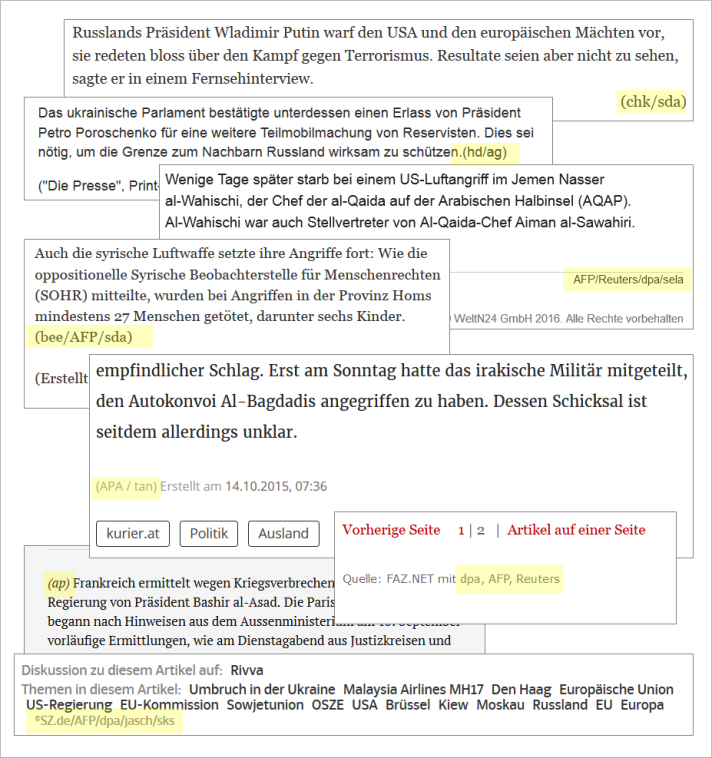The Propaganda Multiplier
Languages: German, French, Norwegian
It is one of the most important aspects of our media system – and yet hardly known to the public: most of the international news coverage in Western media is provided by only three global news agencies based in New York, London and Paris.
The key role played by these agencies means that Western media often report on the same topics, even using the same wording. In addition, governments, military and intelligence services use these global news agencies as multipliers to spread their messages around the world.
A study of the Syria war coverage by nine leading European newspapers clearly illustrates these issues: 78% of all articles are based in whole or in part on agency reports, yet 0% on investigative research. Moreover, 82% of all opinion pieces and interviews are in favor of the US and NATO intervention, while propaganda is attributed exclusively to the opposite side.

The Propaganda Multiplier:
How Global News Agencies and
Western Media Report on Geopolitics
A Study by Swiss Propaganda Research
Translated by Terje Maloy
June 2016
“Therefore you always have to ask yourself: Why do I get
this specific information in this specific form at this moment?
Ultimately, it’s always about questions of power.” (*)
Dr. Konrad Hummler, Swiss banking and media executive
this specific information in this specific form at this moment?
Ultimately, it’s always about questions of power.” (*)
Dr. Konrad Hummler, Swiss banking and media executive
Contents
Introduction: “Something strange”
“How does the newspaper know what it knows?” The answer to this question is likely to surprise some newspaper readers: “The main source of information is stories from news agencies. The almost anonymously operating news agencies are in a way the key to world events. So what are the names of these agencies, how do they work and who finances them? To judge how well one is informed about events in East and West, one should know the answers to these questions.” (Höhne 1977, p. 11)
A Swiss media researcher points out: “The news agencies are the most important suppliers of material to mass media. No daily media outlet can manage without them. () So the news agencies influence our image of the world; above all, we get to know what they have selected.” (Blum 1995, p. 9)
In view of their essential importance, it is all the more astonishing that these agencies are hardly known to the public: “A large part of society is unaware that news agencies exist at all … In fact, they play an enormously important role in the media market. But despite this great importance, little attention has been paid to them in the past.” (Schulten-Jaspers 2013, p. 13)
Even the head of a news agency noted: “There is something strange about news agencies. They are little known to the public. Unlike a newspaper, their activity is not so much in the spotlight, yet they can always be found at the source of the story.” (Segbers 2007, p. 9)
“The Invisible Nerve Center of the Media System”
So what are the names of these agencies that are “always at the source of the story”? There are now only three global agencies left:
- The American Associated Press (AP) with over 4000 employees worldwide. The AP belongs to US media companies and has its main editorial office in New York. AP news is used by around 12,000 international media outlets, reaching more than half of the world’s population every day.
- The quasi-governmental French Agence France-Presse (AFP) based in Paris and with around 4000 employees. The AFP sends over 3000 stories and photos every day to media all over the world.
- The British agency Reuters in London, which is privately owned and employs just over 3000 people. Reuters was acquired in 2008 by Canadian media entrepreneur Thomson – one of the 25 richest people in the world – and merged into Thomson Reuters, headquartered in New York.
In addition, many countries run their own news agencies. However, when it comes to international news, these usually rely on the three global agencies and simply copy and translate their reports.

The three global news agencies Reuters, AFP and AP, and the three national agencies of the German-speaking countries of Austria (APA), Germany (DPA) and Switzerland (SDA).
Wolfgang Vyslozil, former managing director of the Austrian APA, described the key role of news agencies with these words: “News agencies are rarely in the public eye. Yet they are one of the most influential and at the same time one of the least known media types. They are key institutions of substantial importance to any media system. They are the invisible nerve center that connects all parts of this system.” (Segbers 2007, p.10)
Small abbreviation, great effect
However, there is a simple reason why the global agencies, despite their importance, are virtually unknown to the general public. To quote a Swiss media professor: “Radio and television usually do not name their sources, and only specialists can decipher references in magazines.” (Blum 1995, P. 9)
The motive for this discretion, however, should be clear: news outlets are not particularly keen to let readers know that they haven’t researched most their contributions themselves.
The following figure shows some examples of source tagging in popular German-language newspapers. Next to the agency abbreviations we find the initials of editors who have edited the respective agency report.

News agencies as sources in newspaper articles
Occasionally, newspapers use agency material but do not label it at all. A study in 2011 from the Swiss Research Institute for the Public Sphere and Society at the University of Zurich came to the following conclusions (FOEG 2011):
“Agency contributions are exploited integrally without labeling them, or they are partially rewritten to make them appear as an editorial contribution. In addition, there is a practice of ’spicing up‘ agency reports with little effort; for example, visualization techniques are used: unpublished agency reports are enriched with images and graphics and presented as comprehensive reports.”
The agencies play a prominent role not only in the press, but also in private and public broadcasting. This is confirmed by Volker Braeutigam, who worked for the German state broadcaster ARD for ten years and views the dominance of these agencies critically:
“One fundamental problem is that the newsroom at ARD sources its information mainly from three sources: the news agencies DPA/AP, Reuters and AFP: one German/American, one British and one French. () The editor working on a news topic only needs to select a few text passages on the screen that he considers essential, rearrange them and glue them together with a few flourishes.”
Swiss Radio and Television (SRF), too, largely bases itself on reports from these agencies. Asked by viewers why a peace march in Ukraine was not reported, the editors said: “To date, we have not received a single report of this march from the independent agencies Reuters, AP and AFP.”
In fact, not only the text, but also the images, sound and video recordings that we encounter in our media every day, are mostly from the very same agencies. What the uninitiated audience might think of as contributions from their local newspaper or TV station, are actually copied reports from New York, London and Paris.
Some media have even gone a step further and have, for lack of resources, outsourced their entire foreign editorial office to an agency. Moreover, it is well known that many news portals on the internet mostly publish agency reports (see e.g., Paterson 2007, Johnston 2011, MacGregor 2013).
In the end, this dependency on the global agencies creates a striking similarity in international reporting: from Vienna to Washington, our media often report the same topics, using many of the same phrases – a phenomenon that would otherwise rather be associated with »controlled media« in authoritarian states.
The following graphic shows some examples from German and international publications. As you can see, despite the claimed objectivity, a slight (geo-)political bias sometimes creeps in.

“Putin threatens”, “Iran provokes”, “NATO concerned”, “Assad stronghold”: Similarities in content and wording due to reports by global news agencies.
The role of correspondents
Much of our media does not have own foreign correspondents, so they have no choice but to rely completely on global agencies for foreign news. But what about the big daily newspapers and TV stations that have their own international correspondents? In German-speaking countries, for example, these include newspapers such NZZ, FAZ, Sueddeutsche Zeitung, Welt, and public broadcasters.
First of all, the size ratios should be kept in mind: while the global agencies have several thousand employees worldwide, even the Swiss newspaper NZZ, known for its international reporting, maintains only 35 foreign correspondents (including their business correspondents). In huge countries such as China or India, only one correspondent is stationed; all of South America is covered by only two journalists, while in even larger Africa no-one is on the ground permanently.
Moreover, in war zones, correspondents rarely venture out. On the Syria war, for example, many journalists “reported” from cities such as Istanbul, Beirut, Cairo or even from Cyprus. In addition, many journalists lack the language skills to understand local people and media.
How do correspondents under such circumstances know what the “news” is in their region of the world? The main answer is once again: from global agencies. The Dutch Middle East correspondent Joris Luyendijk has impressively described how correspondents work and how they depend on the world agencies in his book “People Like Us: Misrepresenting the Middle East”:
“I’d imagined correspondents to be historians-of-the-moment. When something important happened, they’d go after it, find out what was going on, and report on it. But I didn’t go off to find out what was going on; that had been done long before. I went along to present an on-the-spot report. ()
The editors in the Netherlands called when something happened, they faxed or emailed the press releases, and I’d retell them in my own words on the radio, or rework them into an article for the newspaper. This was the reason my editors found it more important that I could be reached in the place itself than that I knew what was going on. The news agencies provided enough information for you to be able to write or talk you way through any crisis or summit meeting.
Further Reading: https://swprs.org/the-propaganda-multiplier/



Geen opmerkingen:
Een reactie posten